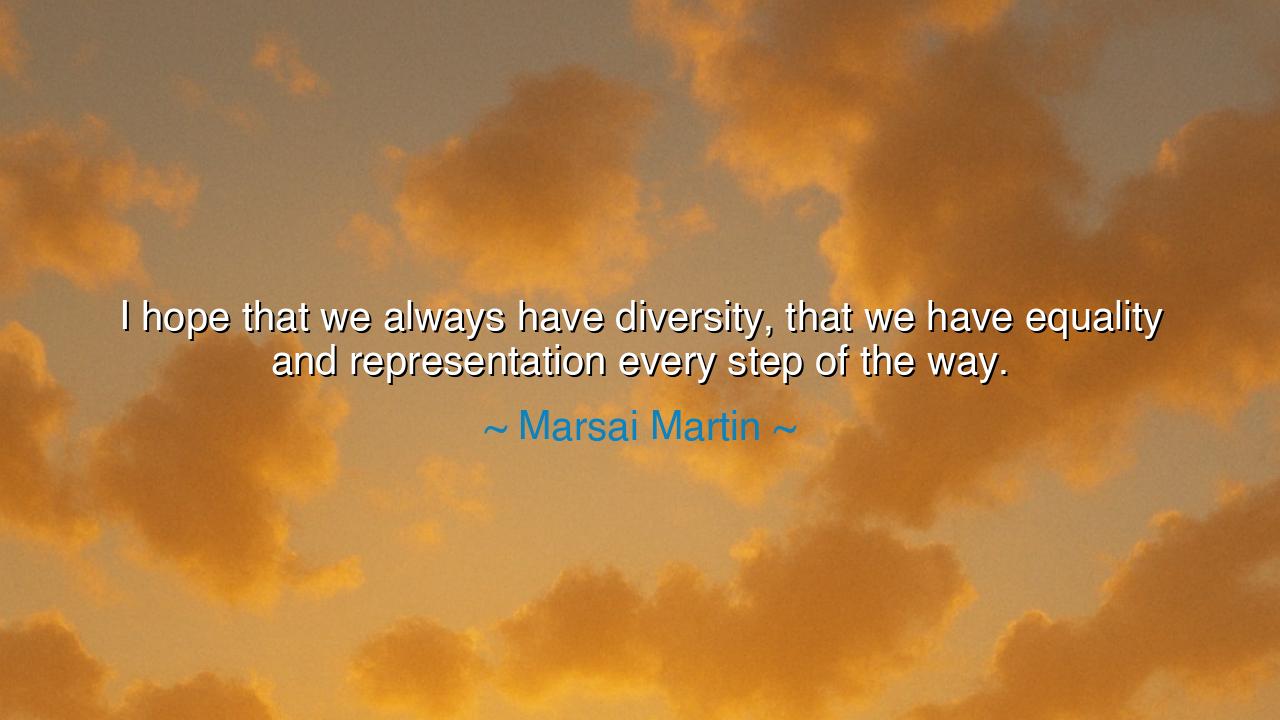
I hope that we always have diversity, that we have equality and
I hope that we always have diversity, that we have equality and representation every step of the way.






I hope that we always have diversity, equality, and representation—a prayer for the world, a vision for humanity’s future. These words, spoken by the young and wise Marsai Martin, echo with the ancient longing of all who have ever yearned for a world where all voices are heard, where every person can stand tall in their truth, and where no soul is cast aside for lack of color, creed, or circumstance. In these simple yet profound words, Marsai speaks not only of hope but of a call to action—an invocation that we must do more than wish for these ideals; we must live them, breathe them, and demand them in every step of our journey.
Diversity—the very essence of life itself—flows through the veins of creation. Think of the world as a garden, where every flower, tree, and vine has its own beauty, its own place. The strength of the garden lies not in uniformity, but in the rich tapestry of varied forms. Diversity brings vibrancy, fosters creativity, and sparks innovation. Without it, we become stagnant, the water of life no longer flowing freely but trapped in the confines of sameness. Yet in the gardens of our societies, too often we see the vibrant colors of some flowers overshadowing the tender shoots of others. It is a bitter reality that calls for the reclamation of space, for the opening of hearts and minds to the beauty of what is different, what is unique, what is often overlooked.
In ancient times, the great empires of the world—be it the Egyptian, the Roman, or the Chinese—were built not on the narrow vision of a single race or culture, but on the diversity of the lands they ruled. The Greeks, whose wisdom has endured through the ages, understood that the exchange of ideas, the mingling of peoples, was the very foundation of growth. Equality—the idea that all people, regardless of their station or their heritage, should have a voice in the governance of their lands—was a dream that echoed in the hearts of philosophers like Socrates and Plato. Though these ideals were not fully realized in their time, the very presence of these ideas stirred the hearts of those who would come after, pushing them toward a future where representation would be more than a mere whisper in the wind.
It is in the face of such wisdom that we must stand today, as the world grapples with questions of equality and representation. The journey toward a truly equal society has been long, fraught with struggle, yet every victory, every step forward, has been won through the labor of those who refused to accept the status quo. Consider the story of Rosa Parks, whose quiet defiance on a bus in Montgomery ignited a movement that would forever change the course of history. Her act of courage was not an isolated one, but part of a larger tapestry woven by countless individuals who, in their refusal to be silenced, demanded not just equality but representation in every facet of life. They fought not for themselves alone, but for the generations yet to come—those who would one day breathe in the fruits of their struggle.
Marsai’s hope is a reflection of that same eternal struggle—a vision that we should never stop seeking representation at every level. It is not enough to stand in the halls of power, in the world of art and entertainment, and look around only to see the faces of those who have always held the reins. Representation means that every story is told, that every voice is heard, and that every person—no matter their origin—has a stake in the shaping of their world. Whether it be in the media, the workplace, or the government, each person must be able to see themselves reflected in the spaces they inhabit. Only then can we say that we are a society that truly honors the diversity of the human experience.
The lesson of Marsai’s words is this: we must live as stewards of equality, champions of diversity, and defenders of representation. It is not a task for the few but for the many. We must be ever watchful, ever diligent, ensuring that no one is cast aside or forgotten. In our daily actions, in our words, in the choices we make, we must embody the ideals of inclusivity. Whether in the classroom, in the workplace, or at home, we must ask ourselves: “Am I creating space for others? Am I lifting others up?” For to live in a world where equality and representation flourish is to live in a world where every person is given the chance to rise and to shine.
Let us not allow the dreams of diversity, equality, and representation to remain distant ideals, but let us work tirelessly to make them a living reality. Just as Rosa Parks stood with quiet strength, or Mahatma Gandhi marched with purpose, we too must take steps—no matter how small—that push the world toward the vision that Marsai has shared with us. In our own way, we must plant the seeds for future generations, creating a legacy of justice, of freedom, and of inclusivity that will echo long after we are gone. And as we walk this path, let us never forget: the strength of a society lies not in its uniformity, but in its diversity, its equality, and its representation of all peoples. Only in such a world can we say that we have truly fulfilled our destiny as a united and just civilization.






AAdministratorAdministrator
Welcome, honored guests. Please leave a comment, we will respond soon